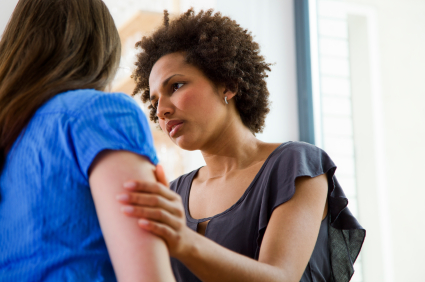Who can help?
Depression and low mood can be paralysing - sometimes to such a degree that some people find it hard to seek help. Even worse they may start to think that no amount of help could ever help them to feel better. “Yet nothing could be further from the truth,” says Amelia.
“Recognising and accepting that there is a problem, is the first step to getting better. Taking that first step can be the hardest one for someone to take but they need to be reminded that there is plenty of support out there,” she adds.
“For most people the best treatment is a combination of talking treatments and self-help and, if they are affected by moderate to severe depression, medication but each individual is different and the package of care that will work for them is different too. For some people it can take a while to get the right treatment and they will probably need the support of family and friends to remind them that there is light at the end of the tunnel,” says Amelia.
Don’t allow them to suffer in silence
If someone is feeling more low or depressed than normal and you notice it is starting to affect their work, interests and relationships you need to try to persuade them to share their feelings with you or, preferably, their doctor. It is important to point out that there is no stigma attached to admitting to depression – especially when admitting it is part of the way forward. They don’t have to suffer in silence. There is plenty of help out there and finding the right support and right treatment can help to stop ‘the black dog’ taking over their life. There are national (NICE) guidelines for doctors on how to treat depression and low mood.
“In cases of mild depression doctors should not immediately reach for their keyboards to type out a prescription,” says Dr David Edwards, a GP from Chipping Norton. “The mainstay of therapy depends on talking or computer-based self-help treatments which a doctor can advise on, but the precise method may vary depending on local expertise as well as patient preferences. Some prefer talking face to face with someone, while others prefer the anonymity of the Internet. In some cases medication might also be advised,” he adds.
These days most prescriptions for treating depression are for the Selective serotonin reuptake inhibitor (SSRI) group of medications. “Rarely there is still a place for the older forms of antidepressants in some patients in spite of their side effects and safety issues,” explains Dr Edwards. “However SSRIs are not without their own problems. Recent research found that side effects affected a number of patients. The most common ones cited were dry mouth (15%), Lack of libido (15%) and headaches (11%),” he adds.
In cases of moderate or severe depression the GP might refer on to get the help of the local mental health team to share the individual care and needs of a patient.
In general most people get better faster with a combination of treatments - medication to relieve symptoms and talking therapy to learn how to deal with stress, anxiety and negative thinking. Self-help measures including herbal remedies and relaxing therapies can also be beneficial.
